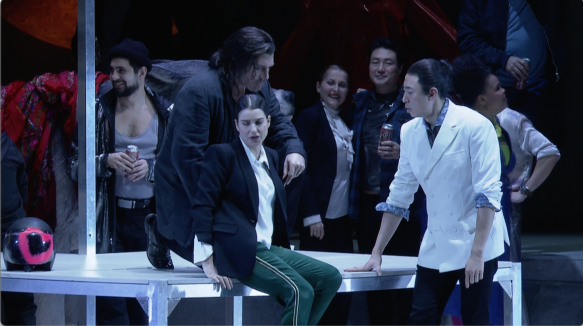The 2019 production from the Opernstudio der Bayerischen Staatsoper (basically their young artists programme) was a bit unusual. Director Axel Ranisch created a kind of mash up of Tchaikovsky’s Iolanta and Stravinsky’s very short opera Mavra. Iolanta is about a blind princess who doesn’t realise she is blind. It’s only when she meets her future husband, a French count Vaudémont, that she realises this. Her father the king employs a Moorish doctor to try and cure her, which fails, but believing that if she doesn’t pretend to be sighted her suitor will be executed she fakes it and is given to him in marriage. He alone realises she is still blind and puts out his own eyes in sympathy (this is pretty hard to watch!). In the process they both realise that God’s creation is much greater than human eyes can perceive.
 Continue reading →
Continue reading →





 I first came across Russian soprano Ekaterina Siurina as Zerlina in the 2008 video recording of Mozart’s Don Giovanni from Salzburg. She had had plenty of success already in coloratura roles such as Gilda and Adina and was, I thought, the best Zerlina I had come across. Fast forward to 2015 and she sang a very fine Violetta at the Four Seasons Centre opposite her husband Charles Castronovo. A few years on and it’s not terribly surprising that she’s starting to venture into slightly heavier lyric-dramatic territory. This is reflected in her recent album Where is My Beloved? recorded in 2022 with the Kaunas Symphony Orchestra conducted by Constantin Orbelian.
I first came across Russian soprano Ekaterina Siurina as Zerlina in the 2008 video recording of Mozart’s Don Giovanni from Salzburg. She had had plenty of success already in coloratura roles such as Gilda and Adina and was, I thought, the best Zerlina I had come across. Fast forward to 2015 and she sang a very fine Violetta at the Four Seasons Centre opposite her husband Charles Castronovo. A few years on and it’s not terribly surprising that she’s starting to venture into slightly heavier lyric-dramatic territory. This is reflected in her recent album Where is My Beloved? recorded in 2022 with the Kaunas Symphony Orchestra conducted by Constantin Orbelian. 



